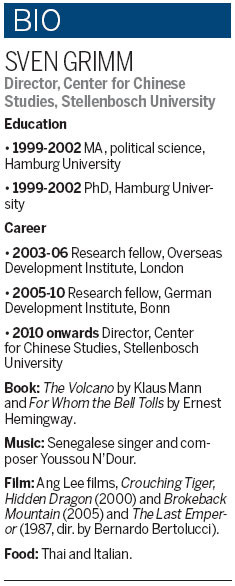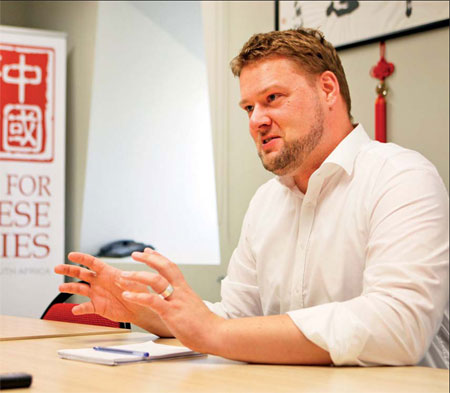Power of togetherness
Updated: 2013-07-12 08:53
By Andrew Moody (China Daily)
|
|||||||||||
|
Western nations are playing a blame game in Africa, says Sven Grimm. Mark Wessels / for China Daily |

Africa must see china as a catalyst for economic development, says academic
Sven Grimm says the West is playing a "blame game" when it accuses the Chinese of grabbing Africa's resources.
The director of the Center for Chinese Studies at Stellenbosch University says it is a "dishonest" argument because the bulk of Africa's rich natural resources still go to Europe and the United States.
"There is a China blame game where the West accuses China of using all of Africa's resources. It is dishonest because although China has made a major investment in raw materials in Africa, a major chunk of these resources still go to Europe and the US," he says.
"The Western companies are, in fact, still the major players and there is a defensiveness and also aggressiveness on the Western side that is a bit unnecessary."
Grimm, 41, was speaking in a seminar room on the Stellenbosch campus that dominates the town that is also famous for being among the vineyards of the Western Cape.
The China center, set up in 2004, is the only dedicated China studies institution in sub-Saharan Africa.
"It was set up as a center for Chinese studies and I think the name was misleading because it implied Chinese language and culture. Our work though is mainly as a research center for political and economic relations. We disentangled ourselves from the language side in 2009," he says.
Although heading a China center, Grimm's academic background is in African studies and not Sinology, although the huge development in the China-Africa relationship over the last decade has resulted in an overlap between the two disciplines.
"The interesting thing now is that Africanists and Sinologists now speak to each other, which they hadn't really done previously," he says.
Although he accepts there is a tendency for people to regard African studies as a less substantial study area than that of China, he says it shouldn't be underestimated.
"Sinology is more developed as a subject area and has longer roots but African studies has longer roots than it may appear. Some of it, of course, is linked to colonial history," he says
"One of the major questions for African studies is how people survive in these strange artificial entities called African states and are they happy or disgruntled with that."
Grimm, who is German, studied political science at Hamburg University, where he did academic exchange visits to Cheikh Anta Diop University in Dakar, Senegal, and the University of Ghana at Legon, near Accra.
He went on to work as a research fellow at the Overseas Development Institute, the UK's leading international development think tank before moving back to Germany for a five-year spell at its sister organization, the German Development Institute in Bonn.
With a research study specialization in China-Africa relations, he was an obvious candidate to become director at Stellenbosch in 2010.
Grimm, soft spoken and who speaks as if measuring his thoughts carefully, argues that far from being seen negatively, Africans themselves want to explore the potential of the relationship.
"I think China is considered as a major opportunity by Africans. When you talk of opportunity, of course, it could mean it can go either way but for me, from an African perspective, it is a positive thing to have another partner," he says. "China isn't entirely new. It has been around a long time in Africa. It was a political relationship in the 1960s and 1970s but the scale of engagement is now different. It is extremely pragmatic and about business."
He says it is important, however, for Africa not to see Chinese involvement as a catalyst for development just on its own.
"No external actor can ever trigger development in an African country. There was a bit of self-delusion in the West with their Washington Consensus (fostering of private sector development) in the 1980s that this could be done."
"Development, however, needs African countries to change their policies and to be more strategic in what they are doing."
Grimm does, however, observe that China has inspired a debate in Africa about how countries develop and many wonder whether adopting China's state-planned model could be the way forward for the continent.
"They can see that a new sizeable actor has a different approach to how development can be achieved. You are operating with a very impatient population. People want a better life for themselves and their children now."
"I think Western governments underestimate this pressure on African governments while the Chinese government empathizes because they have been and are under a similar pressure themselves."
Grimm says there is still confusion in Africa and in the West about the extent of the role of the Chinese government on the continent.
He points out that Chinese private sector companies and freelance operators who engage in small scale gold speculating or set up stalls to hawk cheap Chinese goods are often seen as agents of the state.
"The Chinese government can't control the individual migration. Chinese embassies would like to know how many people are in the country but they can't check on that and they don't know," he says.
He says Western companies also do not come under the same scrutiny as Chinese ones, whether they are state-owned or private.
"Western companies just don't face the same challenges. Shell or Unilever are not seen as being from the UK. They are just Shell and Unilever," he says.
Grimm says that Africans too regularly confuse Chinese with other Asians.
"Some Africans assume people are Chinese when they are not. Koreans, Malaysians and even Australians who are ethnic Chinese are labelled as Chinese," he says.
The Africanist also believes China is wrongly seen as being in some sort of battle with the West in some new 21st century scramble for Africa.
"There is this idea that China and the West never meet in the middle but the reality is that often the Chinese work on World Bank projects. The construction company might be Chinese but the project not. This also applies to Chinese companies working on projects for such bodies as the Arab Fund for Economic and Social Development," he says.
As for Africa's future, some argue that the continent will be unable to develop as China has. The reason advanced is that because of cultural differences, Africans cannot adapt to industrialization as easily as Chinese have.
Grimm says that when you closely examine African societies some of these differences don't really exist.
"I don't think the cultural difference is that great. Is Latin America that different from Africa? What about Europe and Asia? I think in terms of modernization, lifestyles are converging," he says.
Grimm makes up to three trips a year to China, sometimes just for 48 hours, despite having to spend more than 15 hours in the air just to get there from South Africa.
"Sometimes the air journey is often longer than the time I spend there," he says.
Not having studied Chinese as an undergraduate, he says his progress at learning the Chinese language has been slow.
"If you wanted to work as an academic in Chinese, it would be a very long-term thing. I am not sure how much you can achieve in a short period of time. As a director, I can't take five hours of class a week so I have to do it in chunks," he says.
"I am very intrigued by the language, however. You get a very different setting of thought patterns that comes from the Chinese characters."
Grimm says that those who study the China-Africa relationship have almost a unique perspective of current developments on the continent and that many are now seeing the same sort of energy that led to the take-off of China 30 years ago.
"There is the same sort of vibrant thing happening in Africa that was seen in China in the late 1980s. There is something going on economically and within society that has the potential to transform the continent," he says.
andrewmoody@chinadaily.com.cn
(China Daily European Weekly 07/12/2013 page32)
Today's Top News
List of approved GM food clarified
ID checks for express deliveries in Guangdong
Govt to expand elderly care
University asks freshmen to sign suicide disclaimer
Tibet gears up for new climbing season
Media asked to promote Sino-Indian ties
Shots fired at Washington Navy Yard
Minimum growth rate set at 7%
Hot Topics
Lunar probe , China growth forecasts, Emission rules get tougher, China seen through 'colored lens', International board,
Editor's Picks

|

|

|

|

|

|






